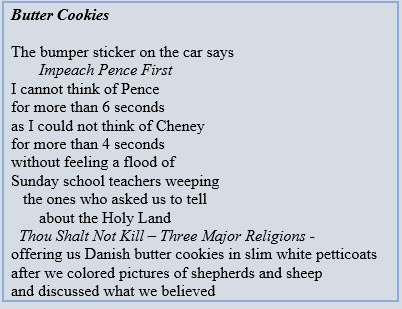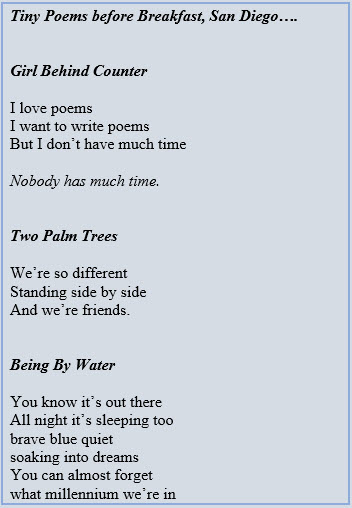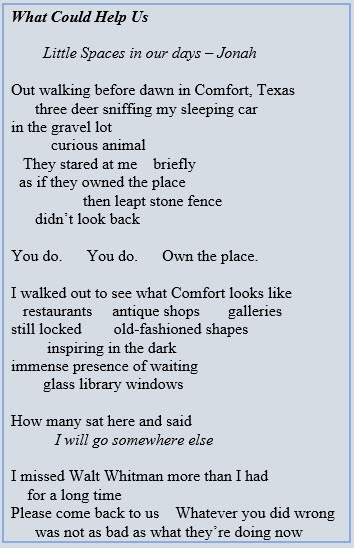
“… the regenerative power of imagination is the wellspring of poets, and we all have a need and a right to keep expressing and exploring it in every way possible throughout our writing lives. It should not be hard to imagine what other people are experiencing.”
Special to Lone Star Literary Life
Living in San Antonio and being an English major who is interested in creative writing, or social justice, you cross paths with the wisdom of Naomi Shihab Nye all over the place—on the page, in the newspaper, and in her many public and free appearances all over town. When I began teaching at my community college in 2001, I told my students they could do a project on a poet, perhaps email-interview them if I could help them connect, and one group picked Naomi. I didn’t have a way to contact her, but I looked her up in the phone book, and there she was. She not only answered her phone, she also said yes to me even though she had no idea who I was, just a local college instructor teaching poems in an intro to lit class. This is Naomi: reachable, authentic, and kind, but with a clear vision of what she wants to say and never too busy to listen or talk. 
In her new book, The Tiny Journalist, she introduces us to a child, Janna Jihad Ayyad, who is not a fictional character but a twelve-year-old girl with a growing following on social media because she is an up-and-coming journalist, working since she was seven. Documenting the horrors of the U.S.-funded occupation in Palestine, Ayyad is unafraid of the soldiers who she films and questions as she reports on the terrors and the crimes against humanity that she has lived and witnessed. My interview with Naomi is about this new book. You can read my review of this book here.
Natalia Treviño for Lone Star Literary Life: Janna has been working as the world’s “youngest journalist” since she was seven years old. Born into a family of activists, she clearly has inspired you to tell more people about her story. How did you first come across her story? What were your initial thoughts, questions, and concerns?
Naomi Shihab Nye: I cannot recall how I first heard about her—probably through one of the many justice-for-Palestinians initiatives I follow. My initial thoughts were, What a brave girl! If she can do it why aren't we all doing more? And how amazed and happy my father would have been to know about her since he always believed in advocacy by children and children's voices. He always urged kids and teens to write more letters to editors and said editors needed to hear their opinions. I wish everyone would watch Janna's brief videos from the past few years on Facebook—especially the so-called Christians who think Israel is a good guy in all matters and embodying God's plan. See what the Israeli soldiers do, and see how much you like it, people. You can really stand up for that behavior?

NT: This book has been released during National Poetry Month, and you are one of the most well-known voices in poetry in the U.S. Your poems have always reached wide audiences around the world. How does its release during National Poetry Month feel to you?
NSN: Well, I consider every month Poetry Month, but I'm happy the book is officially being released right now. BOA Editions [the publisher] is so kind to me and a wonderful publisher to work with. I think Janna's advocacy is pertinent any day of the year. The travesties currently being supported by our own government keep growing. Theft of land, bombastic occupation, is continually coddled and supported. I wish Americans would listen to all the Jewish citizens of any country who do not approve of what Israel does and how it does it. Listen to Miko Peled or Gilad Atzmon. And for Palestinians to listen to, try Dr. Mazin Qumsiyeh of Bethlehem. These people are telling the truth. They are not seeking power for themselves; they are seeking justice. As I said in a long-ago poem called "Jerusalem," "It's late but everything comes next."
NT: Over half of the poems are about Janna directly, but you give many others a chance to speak in your poems as well. To a young writer getting started, what would you say is the value of letting others speak in your poems? For those who may never get to visit with people in Qatar, China, or Palestine, what would you invite young poets to do in order to find interesting voices and deep inspiration in the world close to them? 
NSN: Simply listen to all the people you have access to—your neighbors, your friends, strangers on the street, your family. You don't have to travel far to hear others. Experiment with writing in other voices. It's okay to do this. We need to do this to extend our imaginations and perspective. I remember being very small and trying to imagine what the old lady who never came out of her house would say if she wrote down her thoughts. Then I realized, Hey, I need to go knock on her door and visit with her! She gave me the best piece of pie I ever ate in my whole childhood. And she was lonely, of course, and talked a lot, freely, any time I visited her. We need to take a little more time.
By the way, I liked writing as an "old person" when I was little and that memory helps me now! Gives me more power now to keep writing as a child!

NT: Many poets struggle with putting what may seem like divergent poems in the same collection. Most of your poems in this book deal directly with Janna and Palestine, but then there is a poem about Wales and the National Elk Refuge in Wyoming. Is there a larger concept you used to feather-in these poems into this book?
NSN: I just use what I have. My writing practice is regular but my thoughts of "connection" inside a manuscript are not always conscious and intentional. Poems and topics emerge and happen—I try to find a thread. Hopefully there is one here. The first half of the book is all relating to Palestine and issues of justice, the second half to other places as well but hopefully also to some kind of justice.
NT: It seems like this book is not just meant to call attention to Janna’s bravery, but it opens into a call for us to see our own cowardice and complicity in the dealings between the U.S. and its role in the occupation of Palestine. It feels like a call to both listen and participate. There is a great emphasis on listening here. How do you want your readers to awaken or participate?
NSN: I underscore what you say! People need more information! There are many out there willing to give it to them. The U.S. role in the occupation and oppression of large numbers of people in the world—not just in Palestine but elsewhere and often—should be truthfully acknowledged and regularly questioned by American taxpayers. Many people tell me, after visiting Israel and Palestine, "I had no idea what was really going on." I would hope more people try to find out. It's not a pretty picture.
NT: Like the speaker in “Regret,” many writers and activists “are so tired,” overwhelmed by the amount of defeat, hostility, abuse, and sadness today. You talk about a “superpower” being the imagination in one of your poems. Why is it a “superpower” in the poem, and what gives you strength to offer hope and beauty in poetry while facing such tragedy in the world? 
NSN: I don't really know much about superpowers of any kind. But the regenerative power of imagination is the wellspring of poets, and we all have a need and a right to keep expressing and exploring it in every way possible throughout our writing lives. It should not be hard to imagine what other people are experiencing. Once I wrote about people in our neighborhood who kept having their trashcans stolen (in the old days when we had normal-sized trashcans), or their bird baths from their front yards, and how angry they were. I asked in the poem, What if it were your whole house? Your yard? All your trees? How would that feel? Hello, Palestine!
Many people have no real idea what Israel has really been doing all these years. If you can't go there to see for yourself, read more about it. Or go occupy John Hagee's front yard or house and see how he likes it.
NT: Thank you, Naomi, for your time, for your work, for this wonderful collection, and for your superpower, which I think is poetry for the people, for peace, and justice. In her book, Cuentamelo Otra Vez, my great aunt, the recently deceased Mexican columnist, Blanca Estela Treviño Pepi, wrote something her grandmother, my own great-grandmother, told her: “Poetry is the conch that echoes all the music of the world and the harmony of the universe. It is the only thing that can change the world because it creates a revolution in the mind.” I think you are quite the general, Naomi, for such a revolution.
More of Naomi Shihab Nye's new, never before published poetry will be shared in the April 28, 2019 issue of Lone Star Literary Life.
Naomi Shihab Nye was born in St. Louis, Missouri. Her father was a Palestinian refugee and her mother an American of German and Swiss descent, and Nye spent her adolescence in both Jerusalem and San Antonio, Texas. She earned her BA from Trinity University in San Antonio, where she still resides. Nye is the recipient of numerous honors and awards for her work, including a Lavan Award, the Paterson Poetry Prize, the Carity Randall Prize, the Isabella Gardner Poetry Award, the Lee Bennett Hopkins Poetry award, the Robert Creeley Prize, and many Pushcart Prizes. She has received fellowships from the Lannan Foundation, the Guggenheim Foundation, and she was a Witter Bynner Fellow. From 2010 to 2015 she served as a Chancellor of the Academy of American Poets. On April 27, 2019, she will be awarded the Lon Tinkle Award for Lifetime Achievement from the Texas Institute of Letters.
